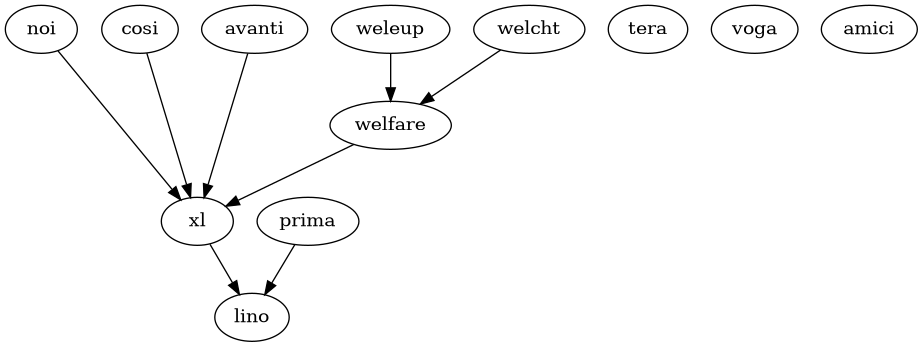Welcome | Get started | Dive | Contribute | Topics | Reference | Changes | More
Repositories of the Lino framework¶
Overview diagram¶

noi, cosi, avanti, weleup, welcht, prima are Lino applications.
General framework repositories¶
The lino package¶
The lino package contains the core of the framework and includes the
Standard Plugin Library, a plugin library with basic features like user
management, notifications, comments, printing and others. These features are
included in most real-world Lino applications.
Project homepage: https://gitlab.com/lino-framework/lino
Lino Extensions Library¶
The lino_xl package contains the Lino Extensions Library.
Project homepage: https://github.com/lino-framework/xl
Application repositories¶
Each Lino application has its own repository. See List of known Lino applications.
We differentiate between “stand-alone” and “privileged” apps. See Lino applications covered by the book.
Documentation repositories¶
These repositories contain mostly .rst source code files used to
generate documentation.
Main website¶
Project homepage: https://gitlab.com/lino-framework/lf
Published at: https://www.lino-framework.org
Community Guide¶
Project homepage: https://gitlab.com/lino-framework/cg
Published at: https://community.lino-framework.org
User Guide¶
Project homepage: https://gitlab.com/lino-framework/ug
Published at: https://using.lino-framework.org
Hosting Guide¶
Project homepage: https://gitlab.com/lino-framework/hg
Published at: https://hosting.lino-framework.org
Developer Guide¶
This repository contains the source code of the Developer Guide
(which you are reading right now), a collection of demo projects (in lino_book.projects), and the main test suite for
the Lino framework.
Project homepage: https://gitlab.com/lino-framework/book
Published at: https://dev.lino-framework.org
Alternative front ends¶
See also About front ends.
React front end¶
ExtJS 6 front end¶
A proof of concept for a Lino front end that uses Sencha’s ExtJS 6 JavaScript toolkit.
OpenUI5 front end¶
A proof of concept for a Lino front end that uses SAP’s OpenUI toolkit.
PyQt front end¶
A proof of concept for a Lino front end that uses the PyQt toolkit.
You can see it by saying pm qtclient in the project directory of any demo project
(after having said pip install PyQt5).
Utilities maintained by the Synodalsoft team¶
Some packages that might be useful to non-Lino Python projects are not covered in the Lino Book because they are actually not at all related to Lino, except that Lino depends on them and that they are maintained by the Lino team:
getlinois the Lino installer. synodal : Metadata about Synodalsoftatelieris a minimalist “development framework”, including a project management a suite of invoke commands and a set of Sphinx extensions.rstgenis a library to generate reSTructuredText snippets.etgenis used for generating HTML or XML via ElementTree.
eidreader¶
See https://eidreader.lino-framework.org/
See also The EIDReader applet.